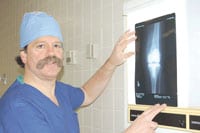Meet The Nurses Frances Bernier Patricia Murphy Gail Wright
Frances Bernier
Wing Medical Center Monson and Ludlow
Position: Nurse Manager
Education: Diploma, St. Vincent Hospital School of Nursing; B.S. in Nursing, Elms College.
Favorite hobby: “Ballroom dancing. I started last fall, and it’s kind of taken over my life.”
Why she got into nursing: “When I went into nursing school, there weren’t many career options for women at the time. You could become a teacher, nurse, or receptionist, and I didn’t want to do the other two things.” Even in nursing school, Bernier wasn’t sure — until one of her teachers called her on her attitude. “She said, ‘you’ve got to make up your mind. You’re not interested in what you’re doing.’ That shook me up, but I thank her to this day for having that conversation. From that day forward, I realized that there was nothing else that I wanted to do.”
Favorite aspect of the job: “Face-to-face interaction with patients. In the job I have now, sometimes the patients are a little too far away from me, but I really enjoy the patients, whether it’s taking care of them at a visit or helping them resolve a problem they might have with billing or medication.”
Most challenging aspect of the job: “In my role as nurse manager, the hardest thing for me is to make sure we can continue giving good, safe, quality care and still meet all the budgetary guidelines. We have to deal with insurance companies and especially managed care, so it’s a job of educating not only patients, but also the physicians and nurses who work with patients. We want do what’s best for patients, but we have to work with all these factors, and it can get kind of mind-boggling.”
How has the industry changed? “First of all, there’s a lot more technology. Also, the longer I’m in nursing, the more I feel the nurse is the patient’s advocate. I feel that more today than I did 10 years ago. The insurance changes in health care are also very difficult. Managed care didn’t even exist 15 years ago, and now there’s very little you can do that isn’t affected by managed care.”
How would she improve nursing? “I think nurses have to support one another. They have to forget about their own egos sometimes and do what’s best for patients and each other, because if the nurses don’t take care of each other and support each other, we’re not going to get more people in the field or keep people in the field. We have to try to change things for the patients because, as a group, we have high numbers, so we have to become more vocal in making some of these changes.”
Patricia Murphy
Mercy Medical Center Springfield
Position: Clinical Nurse Supervisor for the Respiratory and Orthoneural units
Education: Associate’s in Nursing, Springfield Technical Community College.
Favorite Hobby: “My kids. I do a lot of soccer and things with my kids.”
How she got into nursing: Murphy first got a taste for nursing as a Red Cross volunteer at a U.S. Army hospital in 1970, during the Vietnam War. “I was working in the ER and daily would help offload C-130s with young soldiers no more than two years older than myself. I watched the medics and nurses caring for them at what was probably the lowest point in their life. At that point, I knew that was what I wanted to be.” Later, she joined the Air Force Reserve, then went on to nursing school. In Saudi Arabia during the Gulf War, assigned to an airborne Ranger unit, she was able to draw on her past wartime experiences in dealing with nervous, young military personnel. “Many came away with a better understanding of the reality of war.” Now, working in a hospital whose mission statement speaks of ‘compassionate care,’ Murphy said, “I now realize a dream and endeavor to help the next generation of nurses find theirs.”
Favorite aspect of the job: “When I’m working in the ER, I like the excitement. Up on the floors, I get to see the patients more as they continue through the process of getting better. I like the rapport with patients and families. I see a lot of them on the outside and become friends with them.”
Most challenging aspect of the job: “Making sure we’re adequately staffed for the number of patients we have. Right now, the ratios are probably seven or eight patients to one nurse. I try to make sure they get what they need to do their jobs.” On one occasion, she saw nurses’ needs from the other side, when she was a patient for 12 days in her own unit. “I got to know the staff inside and out.”
How has the industry changed? “All the patients are sicker now when they come in, and they’re still sick when they leave. There’s a higher acuity of patients. They used to come the night before surgery, get prepped, and stay until they were all better. Now, a lot of them are in and out on the same day.”
How would she improve nursing? “They need more hands-on training in nursing school. The more often they’re in a clinical rotation, the more comfortable they’re going to feel. Nursing programs only teach so much for the boards, so a lot of nurses have to get on-the-job training when they get out.”
Gail Wright
The Village at Laurel Lake Lee
Position: Director of Nursing
Education: Associate in Nursing, Berkshire Community College; currently working toward B.S. in Nursing, Berkshire Community College.
Favorite Hobby: Sewing; for instance, making dresses for her daughter, christening gowns for people, etc. “That’s the hobby my mother always had, so it was important for me to learn. It helps me relax.”
How she got into nursing: “When my mother was ill with multiple sclerosis, I was one of five children who cared for her at home. I kind of had a knack for it, and my mother recommended I become a nurse. I started at 17 years old working in a long-term care facility as a nursing assistant, and the more I got into it, the more I wanted to be a nurse.”
Favorite aspect of the job: “I really love working with elderly people. Caring for someone who is older is a whole different level of care because you take care of them as a whole person: the emotional aspects, how they think, social issues — not just one disease or condition. In the hospital, you might treat a cardiac problem, for example, but we take care of the whole person here. The elderly need more praise, and people need to care for them. That what our futures are going to be, and they deserve more respect.”
Most challenging aspect of the job: In a managerial position, it’s dealing with the social issues of the staff. “You’ve got to understand the staff as human beings. A lot of young people have problems at home but don’t have support systems. They come with their own issues, so you have to work with them as a friend. Paperwork is always part of the job, but you have to have some caring inside you for everyone you work with. They’re the same skills you use to take care of any patient.”
How has the industry changed? “We’re now doing more work getting people back into the community. Before, someone in their 90s with a fractured hip would stay here for the rest of their lives, but now we try to bring them back home. A nursing home isn’t just a nursing home, but a rehabilitation center, and that’s a very big, positive change.”
How would she improve nursing? The nursing crunch, and the resulting competition among providers for personnel, has taken its toll on nurses’ work ethics, Wright says. “It’s unfortunate, but I think nurses are going into nursing now for the financial aspects of it — ‘who can pay me better?’ — not for the purpose of caring for people. That isn’t what you come into this profession for.”




Comments are closed.